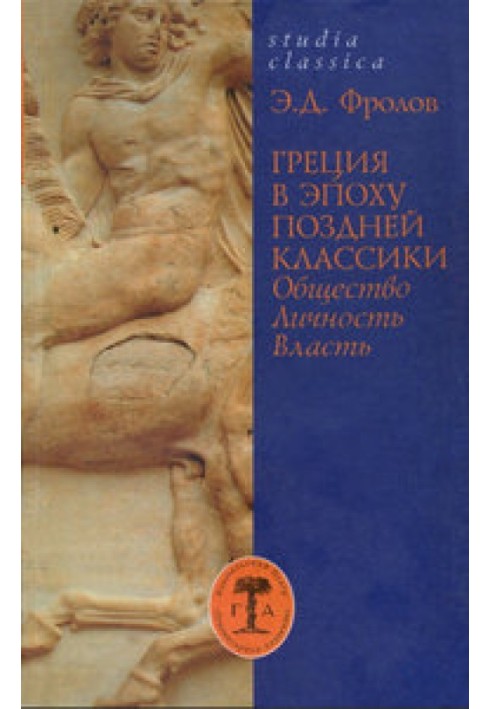Greece in the Late Classical Age (Society. Personality. Power)
 Instant download
Instant download
after payment (24/7)
 Wide range of formats
Wide range of formats
(for all gadgets)
 Full book
Full book
(including for Apple and Android)
The book by St. Petersburg State University professor E. D. Frolov is dedicated to a dramatic moment in the history of Ancient Greece - the era of the late classics (end of the 5th - 4th centuries BC), when, after a short period of prosperity, the ancient civilization of city-states faced its first difficulties , generated by the natural course of development. Economic and political life overflowed through the tight confines of urban communities, and the energy and will of an individual who realized his strength exploded the foundations of the traditional polis order. A sign of the times was the conflict between a strong personality and civil society, which resulted in the widespread emergence of regimes of personal power. Drawing on a wide range of sources, the author shows that despite the successes that these regimes sometimes achieved, they were, in their inner essence, deeply flawed and did not have a historical perspective, since even such brilliant rulers as Dionysius of Syracuse or Philip of Macedon were unable to overcome their own sovereign ambitions for the sake of positive interaction with the world of Greek city-states. Table of contents: Preface.....5 Part I. Greek society in a whirlpool of turmoil (end of the 5th - 4th century BC).....9Chapter 1. Fatal test of success...9Chapter 2. Crisis of the polis.....35Part II. Revival of tyranny (“Greek Tyrants” (L. , 1972))Introduction .65Section I. Forerunners of the younger tyranny71Preliminary remarks...71Chapter 1. Athens..74Chapter 2. Sparta109Section II. Tyrannical regimes in Balkan Greece....136Preliminary remarks.136Chapter 3. Thessaly.....1411. On the way to tyranny.....1412. Reign of Jason......1583. Decline of Therso-Thessaly tyranny under Jason's successors 184Chapter 4. Phocis......2061. Political development and state of Phocis on the eve of the 3rd Holy War.......2062. "National" tyranny Philomela.2153. The authoritarian regime of Philomelos' successors..226Chapter 5. Peloponnese257Preliminary remarks.2571. The tyranny of Euphron in Sikyon....2582. Timofan's putsch in Corinth......275Conclusion...287Part III. Sicilian experiment. Power of Dionysius (“Sicilian Power of Dionysius” (L., 1979)) Introduction...... 2911. Late classical tyranny in Sicily as a historical problem.... 2912. Ancient historical tradition about Dionysius. 2973. The state of Dionysius in the assessment of the historiography of modern times 306Section I. The establishment of tyranny.......319Chapter 1. Political crisis in Syracuse at the end of the 5th century.3191. Strength and weakness of the Syracuse Republic3192. The putsch of Hermocrates......328Chapter 2. The coming to power of Dionysius......339Chapter 3. The creation of arche....364Section II. State of Dionysius .....386Chapter 4. Personal power of Dionysius...386Chapter 5. Syracuse civil community.....402Chapter 6. Elements of a new structure.....4121. “Friends” ...4122. Mercenaries..4203. Administration..432Chapter 7. The problem of political synthesis......435Chapter 8. The Power of Dionysius....444Conclusion...466Part IV. Illusions of doctrinaire and political reality 469Chapter 1. Ideology of Panhellenism...469Chapter 2. The Greco-Macedonian power of Philip...498Chapter 3. Philosopher in power: the reign of Demetrius of Phalerum in Athens (317-307 BC. ) ..5351. Historical background.....5372. Sources and historiography.....5393. Biography of Demetrius of Phalerum before his rise to power.... 5424. Reign Demetrius in Athens......5455. The life of Demetrius in exile....559Chapter 4. The crown of the creative efforts of authoritarianism: the Alexandrian Museion...5651. General concept of Museyon.5672. Museion as a private community of learned admirers of the Music... 5673. Royal Museion in Alexandria....582Instead of a general conclusion589Bibliographical Appendix..593List of abbreviations......597
Data sheet
- Name of the Author
- Эдуард Фролов Давидович
- Language
- Russian
Reviews
Вражаюче дослідження епохи пізньої класики в Греції!
Книга професора Е. Д. Фролова є справжнім науковим шедевром, що глибоко аналізує складні соціально-політичні процеси, які відбувалися в Греції в період пізньої класики. Автор майстерно сплітає історичні факти з аналітичними висновками, що дозволяє читачеві не лише зрозуміти, але й відчути атмосферу того часу. Особливо вражає детальний розгляд конфлікту між особистістю та суспільством, а також вплив тиранічних режимів на розвиток полісів. Фролов використовує широкий спектр джерел, що робить його аргументи переконливими і обґрунтованими. Книга стане незамінним джерелом для студентів, істориків та всіх, хто цікавиться античною історією. Рекомендую всім, хто прагне глибше зрозуміти складні механізми влади і суспільства в давньогрецькій цивілізації!











